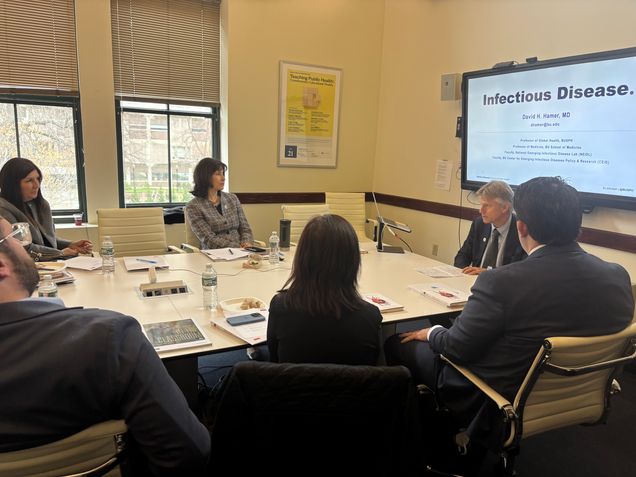CEID faculty provide public health testimony to state lawmakers
Several CEID faculty have recently provided their expertise in infectious diseases and broader public health to help shape state public health policies. CEID Director Dr. Nahid Bhadelia provided testimony to the Massachusetts state senators and representatives on the Massachusetts Joint Committee on Public Health, chaired by Sen. Bill Driscoll and Rep. Marjorie Decker. Speaking to the committee at the State House on March 26, 2025, she addressed the need to ensure healthcare system resilience, preparing for H5N1 avian influenza, federal funding for infectious disease research, and declining vaccine confidence.
 She detailed the need to ensure our healthcare system remains ready and resilient against new infectious diseases threats by addressing workforce shortages, ensuring healthcare worker training and safety, and facility readiness to care for patients with highly communicable infections.
She detailed the need to ensure our healthcare system remains ready and resilient against new infectious diseases threats by addressing workforce shortages, ensuring healthcare worker training and safety, and facility readiness to care for patients with highly communicable infections.
Addressing a significant gap in resources that provide real time awareness of new threats to clinicians, clinics and hospitals, she shared about the role that CEID’s upcoming platform, the Biothreats Emergence, Analysis and Communications Network (BEACON), will play in providing this type of timely information to clinicians.
Dr. Bhadelia underscored the public health significance of current H5N1 avian influenza outbreak in the US and globally. “Although, Massachusetts is ahead of the curve compared to many states in terms of bulk milk testing and the proactiveness of our state department of health,” she said, “we need to take a systematic and coordinated approach to assess our readiness for this threat across animal and human health.”
She also expressed concern about counties throughout the state with higher rates of parental vaccine exemptions. While Massachusetts overall has lower rates of vaccine exemptions than the national average, these pockets create higher vulnerability to infectious diseases within those communities.
Additionally, the Massachusetts Joint Committee on Public Health came to Boston University’s School of Public Health on April 16, 2025, to hear briefings on a range of public health topics from BUSPH faculty, including Dr. David Hamer who co-leads CEID’s Climate Change & One Health research core.

Dr. Hamer spoke about the ties between climate change and increased infectious disease threats. As the state sees warmer climates, this creates opportunities for mosquito and tick populations to grow and for new species of these to expand their territory into New England. He urged for greater surveillance and preparedness for vector-borne diseases that these insects may carry. This includes both diseases not historically seen in Massachusetts, such as Oropouche, dengue, and chikungunya, as well as upticks of diseases endemic to the state like Lyme disease.
Furthermore, Dr. Hamer expressed his concerns about what federal funding cuts will mean for the state’s outbreak preparedness. In particular he spoke about need for continued funding for infectious disease preparedness and readiness to respond to future outbreaks. Building on Dr. Bhadelia’s recent presentation to the Joint Committee, Dr. Hamer reiterated concerns about the growing measles epidemic in the US, which is now over 700 cases. He emphasized that 97% of the patients with measles in the Texas-New Mexico outbreak were not vaccinated and that the risk is low in MA since we have good vaccine coverage although there are some area like Dukes County that have lower coverage. With the Joint Committee, he discussed the need for improved communication about vaccine safety and prioritization to the general public.